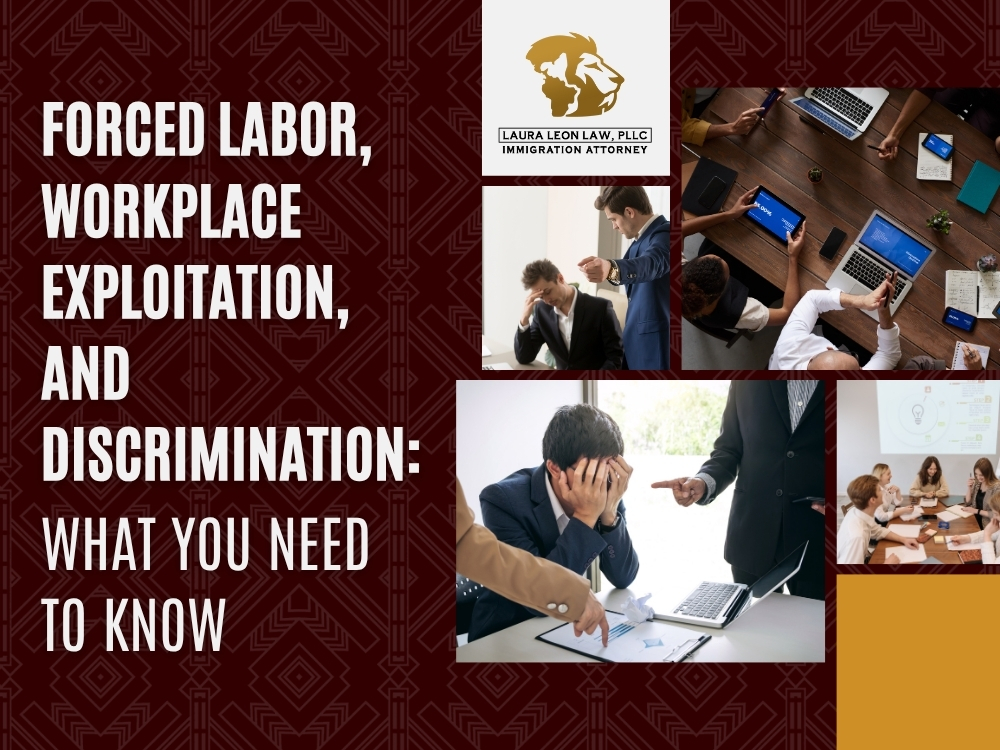What Rights Do Illegal Immigrants Have in the Workplace? How to Seek Protection
IMMIGRATION ATTORNEY LAURA LEON
The terms “Illegal immigrant” and “undocumented immigrant” are often used interchangeably, though “undocumented” is most widely used today. Both refer to individuals who lack valid immigration status or proper work authorization in the U.S.
Undocumented or illegal immigrants in the United States face many challenges at work because many believe that a lack of legal immigration status means they have no rights.
That is not true.
Even if a worker is undocumented, federal and state laws provide certain protections. Understanding what rights undocumented immigrants have in the workplace and how to seek protection is essential to safeguarding dignity, safety, and fair treatment.
Table of Contents
CONTACT US TODAY
TO SCHEDULE A CONSULTATION
Forced Labor, Workplace Exploitation, and Workplace Discrimination Explained
Forced labor refers to situations where individuals are compelled to perform work or services against their will through force, fraud, or coercion.
Workplace exploitation often overlaps with forced labor and may include wage theft, unsafe conditions, or unfair deductions.
Discrimination against immigrants includes treating workers poorly or denying them rights because of their national origin, race, or immigration status.

What Rights Do Undocumented Immigrants Have in the Workplace?
Federal laws afford a range of rights to all workers, including undocumented immigrants. It is vital to know these rights so that undocumented workers can assert them where necessary.
1. Wage and Hour Protections
Undocumented workers have the right to receive at least the federal minimum wage under the Fair Labor Standards Act (FLSA), and where state or local laws set higher minimum wages, those prevailing laws apply. Overtime pay for hours worked beyond 40 per week is also mandated. Employers must not misclassify workers, must keep accurate payroll records, and cannot withhold pay arbitrarily.
2. Safe and Healthy Work Environment
Protections under the Occupational Safety and Health Act (OSHA) cover all workers, whether authorized or not. Undocumented workers have the right to raise concerns about unsafe or unhealthy conditions without fear of retaliation. They may also report work‐related injuries and access medical records connected to those injuries.
3. Protection from Discrimination
Laws enforced by the Equal Employment Opportunity Commission (EEOC) prohibit discrimination based on race, religion, sex, national origin, and other protected classes. These laws apply regardless of immigration status, and the Immigration and Nationality Act also contains provisions preventing discrimination in hiring, firing, or recruiting based on citizenship or national origin.
Other rights undocumented immigrants have in the workplace include the rights relating to immigration-related discrimination, workers’ compensation, and collective rights.
4. Protection from Forced Labor
The forced labor definition is generally broad, but it is considered a serious workplace violation. Under U.S. law, including Department of Homeland Security’s (DHS) Blue Campaign definitions, forced labor involves compelling a person to work through threats, fraud, or coercion.
Victims of forced labor are entitled to protection as soon as the coercive conduct is identified, including:
- Protection under human trafficking laws.
- Ability to report abuses without a safe harbor being conditioned on immigration status.
- Access to certain relief programs and sometimes visas for victims.
- Support from agencies that investigate forced labor, such as the Department of Homeland Security (DHS) and ICE.
CONTACT US TODAY
TO SCHEDULE A CONSULTATION
What To Do If You Experience Workplace Violations
Knowing rights is one thing; enforcing these rights is another. For undocumented immigrants seeking protection from workplace violations, here’s what you can do:
1. Gather Detailed Information and Documentation of Work Done
Keep careful records of hours worked, wage statements, paystubs, and any written communications about job conditions that violate the rights of migrant workers. If you can, document unsafe working conditions, employer threats, or any discriminatory behavior with photographs, texts, emails, or witness statements.
2. Avoid Disclosing Status Prematurely Without Advice
While immigration status should not factor into most rights under labor and anti‐discrimination law, revealing it without legal counsel may create unnecessary risk.
3. File Complaints with Appropriate Agencies
It is not enough to file complaints; it is necessary to do so with the appropriate agencies. For discrimination, contact the EEOC; for wage or hour violations, the U.S. Department of Labor’s Wage and Hour Division; and for unsafe work environments, OSHA. If it has to do with forced labor concerns, report to agencies like the DHS Blue Campaign.
4. Consider Immigration Remedies if Applicable
In some forced labor or human trafficking cases, undocumented persons may be eligible for immigration relief such as T visas, U visas, protection from deportation or other protections tied to assisting law enforcement.
When seeking protection from workplace violations as an undocumented immigrant, legal guidance is always advised at every point, especially when threats have been made to you.
CONTACT US TODAY
Know Your Rights. Protect Your Future. We’re Here to Help.
Every worker deserves dignity and safety, no matter their immigration status. At Laura Leon Law, we help undocumented and illegal immigrants understand their rights, fight exploitation, and seek protection from abuse or discrimination.
Let us guide you through your options with care and confidentiality, contact us today to protect your rights in the workplace.


